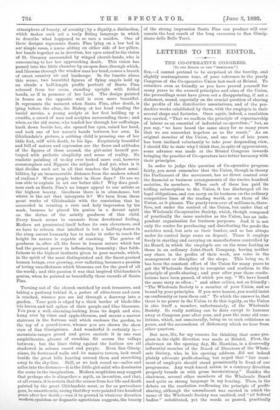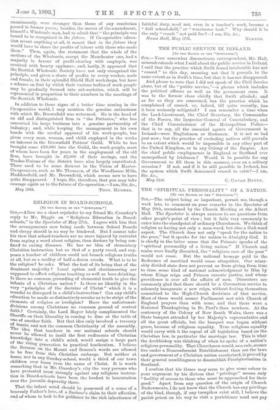LETTERS TO THE EDITOR.
THE CO-OPERATIVE CONGRESS.
[To THE EDITSOZ OF THE " SFICCTATOR."1 cannot pretend to be surprised at the brevity, and slightly contemptuous tone, of your reference to the yearly Congress of the Co-operative Union last week at Bristol. To outsiders even as friendly as you have proved yourself for' many years to the avowed principles and aims of the Union,. the proceedings must have given out a disappointing, if not a dishonest, sound, especially on the crucial question of sharing the profits of the distributive associations, and of the pro- ductive works established by them, with the employs in their several shops and factories. Once again, indeed, a reeolution, was carried, " That we reaffirm the principle of copartnership of labour as an essential of industrial co-operation;" but, as you say, "we have heard the same story for so many years that we are somewhat hopeless as to the result." As an original member of the Union, and one who of late years has been inclined reluctantly to take your desponding view, I should like to state why I think that, in spite of appearances, some advance was made at the Bristol Congress towards. bringing the practice of Co-operators into better harmony with their principles.
In order to judge this question of Co-operative progress fairly, you must remember that the Union, though in theory the Parliament of the movement, has no direct control over the financial or business arrangements of the twelve hundred: societies, its members. When each of these has paid its. trifling subscription to the Union, it has discharged all its. legal obligations, and can carry on its business on the ordinary competitive lines of the trading world, or on those of the' Union, as it pleases. The yearly turn-over of millions is, there- fore, not under the control of the Union, but under that of the Wholesale Co-operative Society, which, though composed of practically the same societies as the Union, has an inde- pendent organisation for business purposes. And it is not only the centre for purchasing and distributing the goods the societies need, but acts as their banker, and so has always. under its control large sums on deposit. These it employs freely in starting and carrying on manufactures controlled by its Board, in which the employes are on the same footing as those in an ordinary Joint-Stock Company, having neither any share in the profits of their work, nor voice in the management or discipline of the shops. This being so, it has been the constant effort of the Union for many years to. get the Wholesale Society to recognise and conform to the principle of profit-sharing ; and year after year those resolu- lutions have been passed, of which you say, "We have heard the same story so often ; " and other critics, not so friendly : "The Wholesale Society is a member of your Union, and so bound by your principles. If you were honest, you would insist on conformity or turn them out." To which the answer is, that there is no power in the Union to do this legally, as the Union is also itself a member, unfortunately, of the Wholesale Society. So really nothing can be done except to hammer away at Congress year after year, and pass the same old reso- lutions, which, not unnaturally, bring on us such criticisms as. yours, and the accusations of dishonesty which we hear from other quarters.
But now, Sir, for my reasons for thinking that some pro- gress in the right direction was made at Bristol. First, the chairman on the opening day, Mr. Hawkins, is a deservedly influential member of the Board of Directors of the Whole- sale Society, who, in hia opening address, did not indeed, plainly advocate profit-sharing, but urged that "fair treat- ment of employ& should stand prominently in front of our programme. Any weak-kneed action in a contrary direction properly brands us with gross inconsistency." Besides the ohairman, several other members of the Wholesale Board used quite as strong language in my hearing. Then, in the debate on the resolution reaffirming the principle of profit- sharing, although the amendment was carried in which the name of the Wholesale Society was omitted, and, "all federal bodies" substituted, yet the words as passed, practically unanimously, were stronger than those of any resolution passed in former years ; besides, the mover of the amendment, himself a Wholesale man, had to admit that " the principle was bound to be recognised in the future. If Co-operative educa- tion meant anything at all, it meant that in the future they would have to share the profits of labour with those who made them." Then, again, the statement that the whole of the sections of the Wholesale, except the Manchester one, had a majority in favour of profit-sharing with employk was received with hearty applause; and, lastly, it appeared that the Scottish Wholesale Society have not only recognised the principle, and given a share of profits to every worker, male and female, in their splendid Shield Hall workshops, but have a scheme on foot by which their various bodies of work-people may be gradually formed into sub-societies, which will be represented in proportion to their numbers in the meetings of the Scottish Wholesale.
In addition to these signs of a better time coming in the Co-operative world, I may mention the genuine enthusiasm with which Mr. Brownfield was welcomed. He is the head of an old and distinguished firm in "the Potteries," who has converted his large business into a genuine partnership of industry ; and, while keeping the management in his own hands with the cordial approval of his work-people, has given every man, woman, and child employed in the works an interest in the Brownfield Potters' Guild. While he has brought some £10,000 into the Guild, the work-people, most of whom have been for years in the employment of the old .firm, have brought in 22,000 of their savings, and the Trades-Unions of the district have also largely contributed. There used to be some distrust in the Union of Master- Co-operators, such as Mr. Thomson, of the Woodhouse Mills, Huddersfield, and Mr. Brownfield, which seems now to have -quite disappeared. I hope, Sir, therefore, that you may take courage again as to the future of Co-operation.—I am, Sir, Ste.,







































 Previous page
Previous page